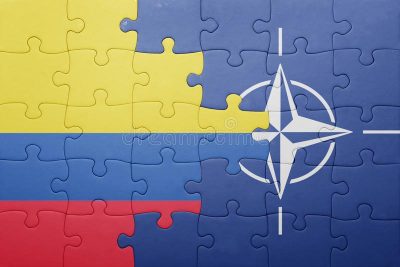Latin America and the Globalization of NATO: Colombia’s Presidential Run-off Will Decide Its “Global Partnership” with NATO
Colombia is about to become NATO’s first Latin American “global partner” right as the country heads towards a tense presidential run-off later this month.

The Transatlantic bloc sees in the South American country a formidable ally with impressive economic, military, and altogether, strategic potential. Colombia’s economy is one of the best-performing in the hemisphere, and it’s also part of the “Pacific Alliance” trading bloc along with Mexico, Peru, and Chile. Its nearly 50 million people represent a huge labor pool and marketplace in the future, with the country’s regional importance also rising as a result of its oil and coal exports. The end of the civil war in summer 2016 also brought about much-needed stability for unlocking these potentials, and Bogotá’s historic military partnership with Washington made it a natural pick for NATO’s strategic expansion to the hemisphere.
About that, the US has been providing massive support to Colombia in its war against communist rebels for decades, but with that conflict having officially concluded two years ago, the country now functions as a centrally positioned springboard for NATO right at the nexus of North and South America, one which has the potential for being used as their proxy against the multipolar ALBA countries of Venezuela and Nicaragua. The first-mentioned one is Colombia’s neighbor that’s been suffering under a US-backed Hybrid War for years already that’s responsible for sparking a heavily politicized regional migrant crisis, while the latter had a maritime dispute with Bogotá in the Caribbean Sea that could be revived through provocations. Colombia could therefore conceivably be used by NATO to advance its unipolar objectives in the region.

The presidential candidate of the Democratic Center party, Ivan Duque (C-R), celebrates after receiving most votes in the first round of the presidential elections accompanied by his family, in Bogota, Colombia, 27 May 2018. With 99.8% of the polls counted, Duque obtained 39.13% with more than 7.5 million of votes, while leftist candidate Gustavo Petro collected 4.8 million votes (25.9%). Duque and Petro will compete in the second round of the Colombian Presidency on June 17
The expansion of “Operation Condor 2.0”, which is what the US’ hemisphere-wide rollback operation of the past 10 years amounts to in evoking strong shades of what happened in the middle of the Old Cold War, could either heat up or be jeopardized depending on the results of this month’s presidential run-off. The hard-right hand-picked successor of the lame duck president scored 15% more of the vote last weekend than his closest second-place left-wing challenger but not enough to win outright. If Senator Ivan Duque comes out on top again, then he’s promised to reconsider some important clauses from the 2016 peace agreement with FARC, which could reignite hostilities in the country, while former Bogotá mayor Gustavo Petro is campaigning on a semi-socialist agenda that could revolutionize the country.
Clearly, Duque’s potential victory would play into NATO’s hands both regionally per the anti-ALBA reasons already explained but also internally by possibly providing the bloc with valuable combat experience if the FARC conflict re-erupts, while Petro would endanger all of that through his electoral socio-economic revolution that would be bound to have geopolitical consequences as well.
*
Andrew Korybko is an American Moscow-based political analyst specializing in the relationship between the US strategy in Afro-Eurasia, China’s One Belt One Road global vision of New Silk Road connectivity, and Hybrid Warfare. He is a frequent contributor to Global Research.

